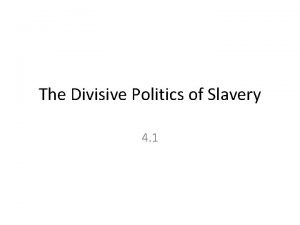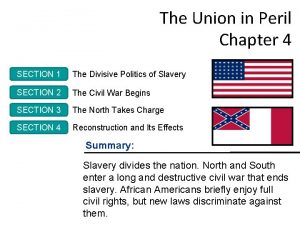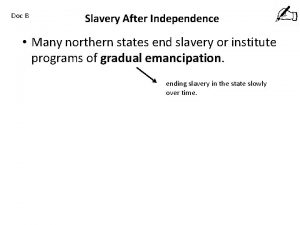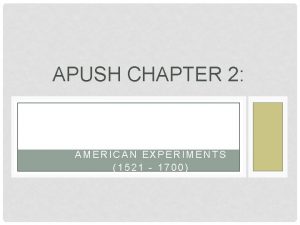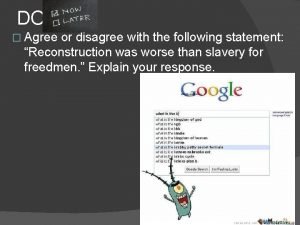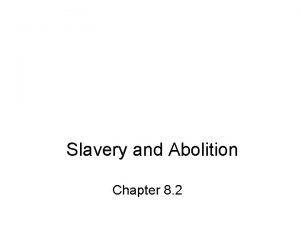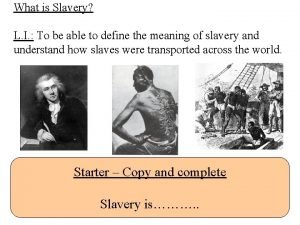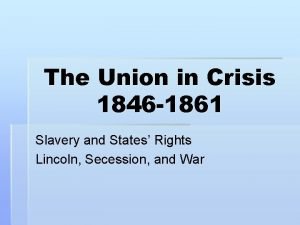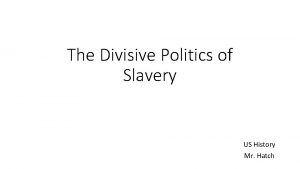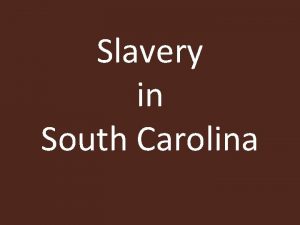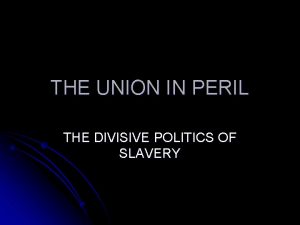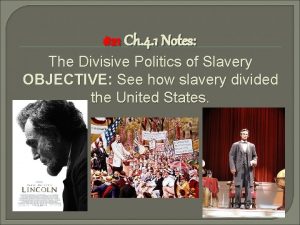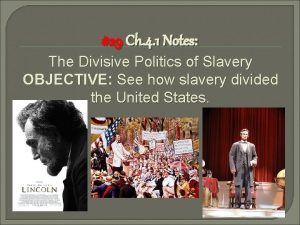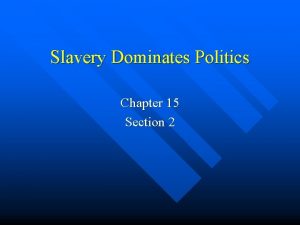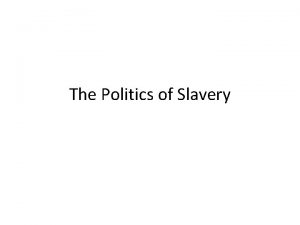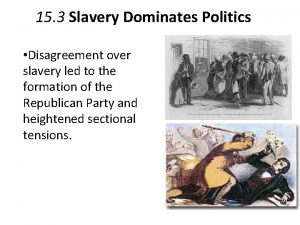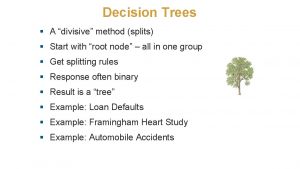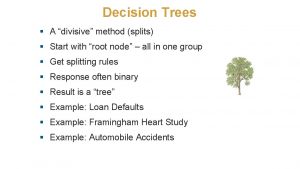The Divisive Politics of Slavery 4 1 The
















- Slides: 16

The Divisive Politics of Slavery 4. 1

The Compromise of 1850 • Background: – 1848: The U. S. had just won a war with Mexico and acquired the territories of New Mexico, Arizona, Utah and California in the treaty • The South hoped to expand slavery into those territories – Westward expansion accelerated with the California gold rush of 1849 – California petitioned for statehood in 1850 – Abolitionists were encouraging and assisting runaway slaves • Southerners felt that the system of slavery was under attack

• Senate Debate on the Compromise of 1850 – John C. Calhoun (SC) threatened to secede from the union if his demands were not met – William Seward (NY) also spoke out against compromise – Daniel Webster of MA urged compromise – Henry Clay of KY offered a compromise bill

• Terms of the Compromise – California admitted to the union as a free state – Popular sovereignty (people’s vote) on the status of slavery in the New Mexico and Utah – A stricter fugitive slave law – Abolition of the slave trade in Washington, D. C.

• Passage of the Compromise – Illinois Senator Stephen Douglas helped by breaking the bill up into parts – President Zachary Taylor, an opponent of the compromise, died after a 4 th of July parade – New President, Millard Fillmore, supported the compromise and signed it into law

Slavery after the Comp.

Protest, Resistance and Violence • Underground Railroad – Secret network of people and escape routes that helped fugitive slaves as they made their way to the north or Canada • Uncle Tom’s Cabin – Harriet Beecher Stowe’s novel attacking slavery – Convinced a generation of young men to become abolitionists

• Kansas-Nebraska Act: 1854 – Stephen Douglas wanted to build a railroad from Chicago to San Francisco (to link CA to the East) – Split the Nebraska territory into two parts and use popular sovereignty to determine slavery in each • “Bleeding Kansas” – Pro-slave and abolitionist (anti-slave) settlers rushed to Kansas to set up governments – Both sides committed gruesome acts of violence • Violence in the Senate – Charles Sumner (MA) insulted the South and Senator Andrew Butler (SC) in a speech – Preston Brooks (Butler’s nephew) took offense and beat Sumner over the head with his cane

Kansas-Nebraska Act

New Political Parties Emerge • Split of the Whig Party – Kansas-Nebraska Act split the Whigs into southern and northern factions- each side looked to form a new political party – Northern Whigs eventually formed the: • Free-Soil Party – Opposed the extension of slavery into the western territories – Free soilers eventually formed the: • Republican Party in 1854 – Opposed the Kansas-Nebraska Act – Wanted to stop the spread of slavery

Election of 1856

Conflict Leads to Secession • Dred Scott v. Sanford, 1857 – Slaves are property even if the master takes them to free territory – Made the entire United States slave territory • Lincoln-Douglas Debates – 1858: Illinois Senate race – Lincoln- how can popular sovereignty exist in the wake of the Dred Scott decision? – Douglas- if the people don’t enforce slavery in their territory it won’t exist there • John Brown’s Raid- 1859 – John Brown tried to lead a slave revolt in Harper’s Ferry, Virginia – Captured, tried and hanged – Northerners turned him into a martyr

• Election of 1860 – Lincoln and the Republicans pledged to stop the spread of slavery and won with only 40% of the popular vote (none in the South) – Democrats split their votes between a Northern (Douglas) and a Southern (Breckenridge) candidate – Bell, a compromise candidate, won VA, KY and TN • Southern Secession – 7 states seceded after the election, before Lincoln took office – Confederate States of America formed with Jefferson Davis as president – Four more seceded after the firing on Ft. Sumter in April 1861

Election of 1860

Seceding States

Secession
 The divisive politics of slavery
The divisive politics of slavery Chapter 4 section 1 the divisive politics of slavery
Chapter 4 section 1 the divisive politics of slavery Metoda k-średnich
Metoda k-średnich Partitional clustering vs hierarchical clustering
Partitional clustering vs hierarchical clustering Toward civil war lesson 3 secession and war
Toward civil war lesson 3 secession and war Chapter 11 cotton slavery and the old south
Chapter 11 cotton slavery and the old south Doc
Doc Colonial slavery apush
Colonial slavery apush Slavery grievance (modified) answer key chart
Slavery grievance (modified) answer key chart Chapter 2 american experiments
Chapter 2 american experiments Worse than slavery cartoon
Worse than slavery cartoon Nat turners rebellion apush definition
Nat turners rebellion apush definition Slavery divides the nation answer key
Slavery divides the nation answer key Fertility rate calculation
Fertility rate calculation Palmer hayden
Palmer hayden Slavery debates
Slavery debates Racism and slavery
Racism and slavery
